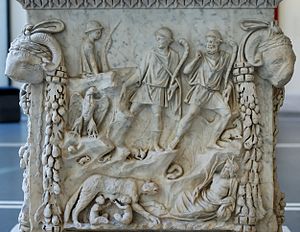Our website is made possible by displaying online advertisements to our visitors.
Please consider supporting us by disabling your ad blocker.
Roman mythology

| Mythology |
|---|
| Part of a series on the |
| Culture of Italy |
|---|
 |
| People |
| Traditions |
Roman mythology is the body of myths of ancient Rome as represented in the literature and visual arts of the Romans, and is a form of Roman folklore. "Roman mythology" may also refer to the modern study of these representations, and to the subject matter as represented in the literature and art of other cultures in any period. Roman mythology draws from the mythology of the Italic peoples and shares mythemes with Proto-Indo-European mythology.
The Romans usually treated their traditional narratives as historical, even when these have miraculous or supernatural elements. The stories are often concerned with politics and morality, and how an individual's personal integrity relates to his or her responsibility to the community or Roman state. Heroism is an important theme. When the stories illuminate Roman religious practices, they are more concerned with ritual, augury, and institutions than with theology or cosmogony.[1]
Roman mythology also draws on Greek mythology, primarily during the Hellenistic period of Greek influence and through the Roman conquest of Greece, via the artistic imitation of Greek literary models by Roman authors.[2] The Romans identified their own gods with those of the ancient Greeks and reinterpreted myths about Greek deities under the names of their Roman counterparts. The influence of Greek mythology likely began as early as Rome's protohistory.
Classical mythology is the amalgamated tradition of Greek and Roman mythologies, as disseminated especially by Latin literature in Europe throughout the Middle Ages, into the Renaissance, and up to present-day uses of myths in fiction and movies. The interpretations of Greek myths by the Romans often had a greater influence on narrative and pictorial representations of myths than Greek sources. In particular, the versions of Greek myths in Ovid's Metamorphoses, written during the reign of Augustus, came to be regarded as canonical.
- ^ John North, Roman Religion (Cambridge University Press, 2000) pp. 4ff.
- ^ Rengel, Marian; Daly, Kathleen N. (2009). Greek and Roman Mythology, A to Z. United States: Facts On File, Incorporated. p. 66.
Previous Page Next Page


